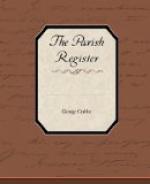Oh! Nathan! Nathan! at thy years trepann’d,
To take a wanton harlot by the hand!
Thou, who wert used so tartly to express
Thy sense of matrimonial happiness,
Till every youth, whose banns at church were read,
Strove not to meet, or meeting, hung his head;
And every lass forebore at thee to look,
A sly old fish, too cunning for the hook;
And now at sixty, that pert dame to see,
Of all thy savings mistress, and of thee;
Now will the lads, rememb’ring insults past,
Cry, “What, the wise one in the trap at last!”
Fie! Nathan! fie! to let an artful jade
The close recesses of thine heart invade;
What grievous pangs! what suffering she’ll impart!
And fill with anguish that rebellious heart;
For thou wilt strive incessantly, in vain,
By threatening speech thy freedom to regain:
But she for conquest married, nor will prove
A dupe to thee, thine anger or thy love;
Clamorous her tongue will be: —of either sex,
She’ll gather friends around thee and perplex
Thy doubtful soul;—thy money she will waste
In the vain ramblings of a vulgar taste;
And will be happy to exert her power,
In every eye, in thine, at every hour.
Then wilt thou bluster—“No! I will not rest,
And see consumed each shilling of my chest:”
Thou wilt be valiant—“When thy cousins call,
I will abuse and shut my door on all:”
Thou wilt be cruel!—“What the law allows,
That be thy portion, my ungrateful spouse!
Nor other shillings shalt thou then receive;
And when I die—What! may I this believe?
Are these true tender tears? and does my Kitty grieve?
Ah! crafty vixen, thine old man has fears;
But weep no more! I’m melted by thy tears;
Spare but my money; thou shalt rule me still,
And see thy cousins: —there! I burn the will.”
Thus, with example sad, our year began,
A wanton vixen and a weary man;
But had this tale in other guise been told,
Young let the lover be, the lady old,
And that disparity of years shall prove
No bane of peace, although some bar to love:
’Tis not the worst, our nuptial ties among,
That joins the ancient bride and bridegroom young; —
Young wives, like changing winds, their power display
By shifting points and varying day by day;
Now zephyrs mild, now whirlwinds in their force,
They sometimes speed, but often thwart our course;
And much experienced should that pilot be,
Who sails with them on life’s tempestuous sea.
But like a trade-wind is the ancient dame,
Mild to your wish and every day the same;
Steady as time, no sudden squalls you fear,
But set full sail and with assurance steer;
Till every danger in your way be past,
And then she gently, mildly breathes her last;
Rich you arrive, in port awhile remain,
And for a second venture sail again.
For this, blithe Donald southward made his way,
To take a wanton harlot by the hand!
Thou, who wert used so tartly to express
Thy sense of matrimonial happiness,
Till every youth, whose banns at church were read,
Strove not to meet, or meeting, hung his head;
And every lass forebore at thee to look,
A sly old fish, too cunning for the hook;
And now at sixty, that pert dame to see,
Of all thy savings mistress, and of thee;
Now will the lads, rememb’ring insults past,
Cry, “What, the wise one in the trap at last!”
Fie! Nathan! fie! to let an artful jade
The close recesses of thine heart invade;
What grievous pangs! what suffering she’ll impart!
And fill with anguish that rebellious heart;
For thou wilt strive incessantly, in vain,
By threatening speech thy freedom to regain:
But she for conquest married, nor will prove
A dupe to thee, thine anger or thy love;
Clamorous her tongue will be: —of either sex,
She’ll gather friends around thee and perplex
Thy doubtful soul;—thy money she will waste
In the vain ramblings of a vulgar taste;
And will be happy to exert her power,
In every eye, in thine, at every hour.
Then wilt thou bluster—“No! I will not rest,
And see consumed each shilling of my chest:”
Thou wilt be valiant—“When thy cousins call,
I will abuse and shut my door on all:”
Thou wilt be cruel!—“What the law allows,
That be thy portion, my ungrateful spouse!
Nor other shillings shalt thou then receive;
And when I die—What! may I this believe?
Are these true tender tears? and does my Kitty grieve?
Ah! crafty vixen, thine old man has fears;
But weep no more! I’m melted by thy tears;
Spare but my money; thou shalt rule me still,
And see thy cousins: —there! I burn the will.”
Thus, with example sad, our year began,
A wanton vixen and a weary man;
But had this tale in other guise been told,
Young let the lover be, the lady old,
And that disparity of years shall prove
No bane of peace, although some bar to love:
’Tis not the worst, our nuptial ties among,
That joins the ancient bride and bridegroom young; —
Young wives, like changing winds, their power display
By shifting points and varying day by day;
Now zephyrs mild, now whirlwinds in their force,
They sometimes speed, but often thwart our course;
And much experienced should that pilot be,
Who sails with them on life’s tempestuous sea.
But like a trade-wind is the ancient dame,
Mild to your wish and every day the same;
Steady as time, no sudden squalls you fear,
But set full sail and with assurance steer;
Till every danger in your way be past,
And then she gently, mildly breathes her last;
Rich you arrive, in port awhile remain,
And for a second venture sail again.
For this, blithe Donald southward made his way,




